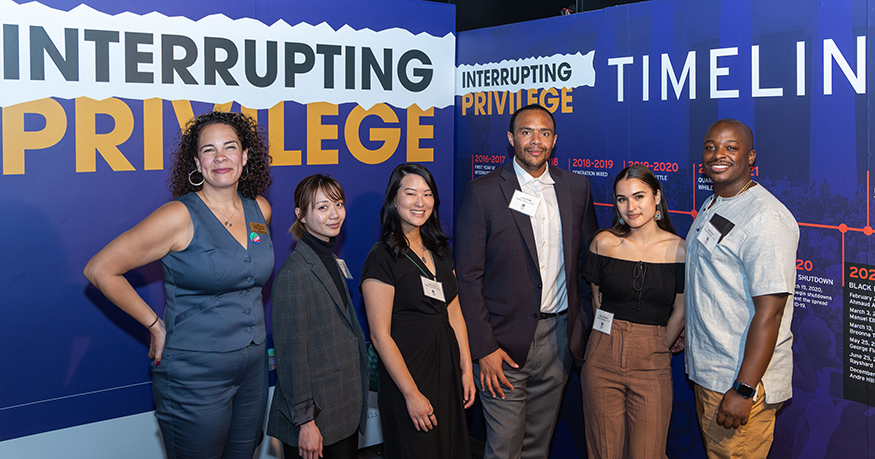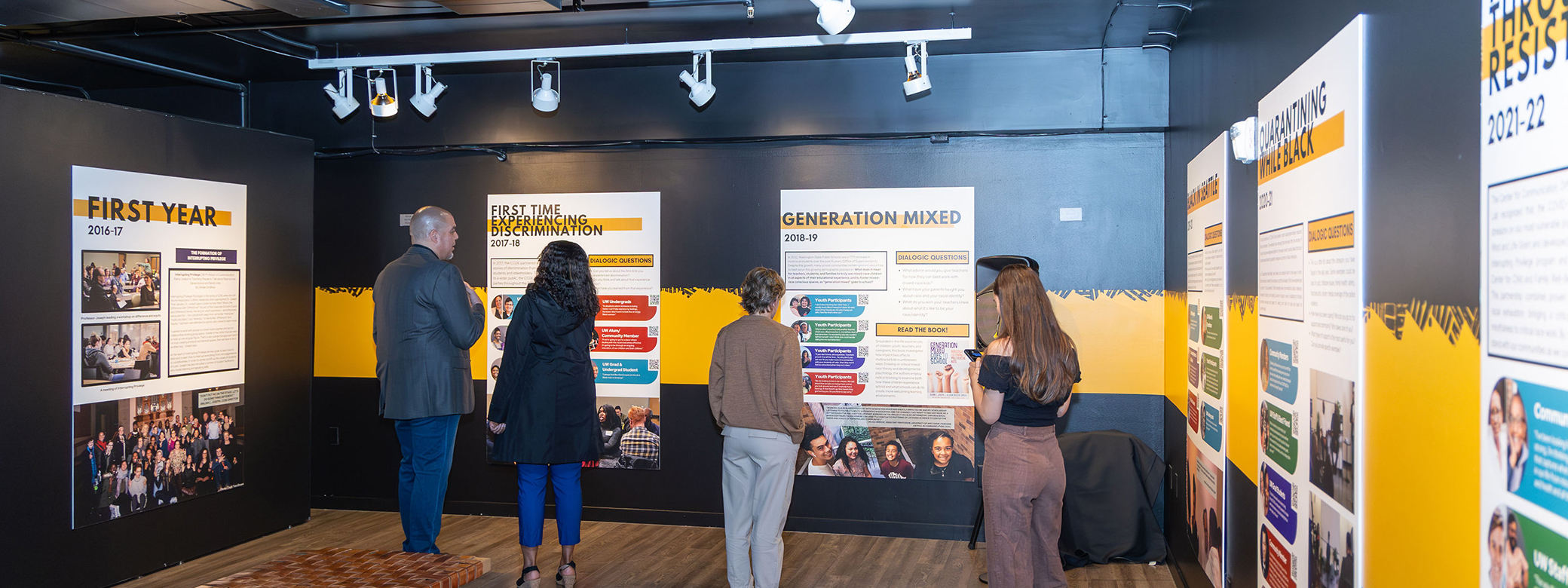
UW communication professor Ralina Joseph is an excellent listener. Through Interrupting Privilege, a program she launched in 2016, Joseph has listened to intergenerational conversations about race and privilege in settings from museums to lecture halls to beauty shops. And she has welcomed the community to listen and reflect with her though a process she refers to as radical listening.
“Our radical listening sessions are an opportunity to listen deeply, with the intent of hearing information in the ways the person sharing it wants it to be heard and not interpreting it through our own lenses,” says Joseph, Presidential Term Professor and director of the Center for Communication, Difference, and Equity (CCDE) in the UW College of Arts & Sciences, and associate dean of equity and justice in the UW Graduate School.
Interrupting Privilege, based in CCDE, leans into difficult discussions with the goal of better understanding and disrupting racism and other forms of inequality. Each year the program explores a different theme, from “Black in Seattle” to “Resilience Through Resistance,” using personal stories as the jumping off point for further discussion.
An exhibition about Interrupting Privilege, developed by UW graduate students working with CCDE, is on view at the Northwest African American Museum (NAAM) through December 2024.
Intergenerational Conversations about Race
The genesis of Interrupting Privilege was an invitation Joseph received in 2016 to present UW lectures on privilege. She responded that instead of lectures, she’d like to bring people together to talk about race. In partnership with the UW Alumni Association, she taught Interrupting Privilege as a Department of Communication course that year, with students and alumni gathering for intergenerational conversations about race.
My goal is to make conversations around race something that people are doing in an everyday way.
“It was a special topics course, an experiment,” Joseph recalls. “The alumni found comfort in all of the brilliance the students brought to that space. Students come to so many experiences with fresh eyes that those of us who have lived more don’t have.”

Joseph began to teach the course regularly, recruiting other UW units to partner with her. When she became NAAM’s scholar-in-residence in 2019, she expanded Interrupting Privilege beyond the University, bringing together community members, high school and community college students, and UW colleagues.
The program has tackled seven themes (see sidebar), focusing on a new one each year. Every iteration begins with one-on-one conversations captured on video, as community members interview each other about their experiences related to the year’s theme. Up to 40 of these dialogues happen annually, with CCDE faculty, staff, and students on hand to “gently facilitate” the conversations.
The dialogues can be intensely personal and powerful. “The people interviewed have a choice to remain anonymous, or to not have their clips shared publicly,” says Joseph. “For some, it is the process of the dialogue, of being heard, that feels fulfilling. For others it is important to have the story publicized as widely as possible. We honor their choices.”
Listening and Reflecting on Shared Stories

With permission, selected clips from the dialogues serve as the source material for radical listening sessions that follow. Joseph finds that personal stories, told by the people who lived them, are a powerful jumping-off point for further discussion.
Anyone interested can attend a radical listening session, with up to four sessions offered annually. Locations have included UW meeting spaces; Soul Collective, a Black-owned beauty shop; and NAAM. At each session, Joseph explains the idea behind radical listening and plays clips from recorded dialogues, then asks the group to turn to their neighbor and discuss what they heard. At the end of each listening session, she addresses the “interrupting” aspect of Interrupting Privilege — strategies for responding to microaggressions. She acknowledges that many people are uncomfortable calling out interpersonal racism.
“I’m always telling people they don’t have to have a perfect response to microaggressions, they just have to have a response,” Joseph says. “People have later told me, ‘In the moment [when a microaggression occurred], I forgot all the strategies you gave us. But I knew that I could say something.’“
Using Stories to Create Anti-Racist Action
Beyond the listening sessions, the many recorded dialogues at the heart of Interrupting Privilege serve as a valuable resource for teaching and research. “I use those clips all the time,” Joseph says. “I did a nine-month professional development training with Seattle Public Schools, with their special education and inclusion leaders, and we started each session with a listening clip. It allows people to go into conversations with more of an open heart and open mind.”

The recordings are easily accessed online, which means those who have shared their personal story only have to do so once. “They’ve given us the gift of their story, and it’s up to us to use it to help create anti-racist action,” says Joseph. “It’s up to us to use those stories of experiencing inequality to help inform conversations about policy, without having to go back to individuals and have them keep testifying about something that might have been the most painful thing of their life.” Brief quotes from some of the clips are featured in the NAAM exhibit, with QR codes provided for those wanting to hear more of the recorded dialogues. (Be sure to bring your phone.)
Interrupting Privilege is now gearing up for its 2024-25 season, which will explore dialogues with BIPOC LGBTQIA+ elders in partnership with GenPride, a Seattle organization that advocates for older LGBTQIA+ adults. As in past years, UW students will assist with the program. Joseph uses funds from her Presidential Term Professorship to cover many program expenses, with donors and annual project partners also providing support. But she hopes to expand the program, which will require far more funding.
“Our dream is to grow Interrupting Privilege through the coalition of African American museums, sharing our Seattle-based stories and launching the program in other cities,” Joseph says. “My goal is to make conversations around race something that people are doing in an everyday way. Our project is based on individuals making changes in their lives, which can lead to changes in their spheres of influence, and ultimately, structural change.”
More Stories

AI in the Classroom? For Faculty, It's Complicated
Three College of Arts & Sciences professors discuss the impact of AI on their teaching and on student learning. The consensus? It’s complicated.

A Sports Obsession Inspires a Career
Thuc Nhi Nguyen got her start the UW Daily. Now she's a sports reporter for Los Angeles Times, writing about the Lakers and the Olympics.

A Healing Heart Returns
In February, the UW Symphony will perform a symphony that Coast Salish elder Vi Hilbert commissioned years ago to heal the world after the heartbreak of 9/11. The symphony was first performed by the Seattle Symphony in 2006.
